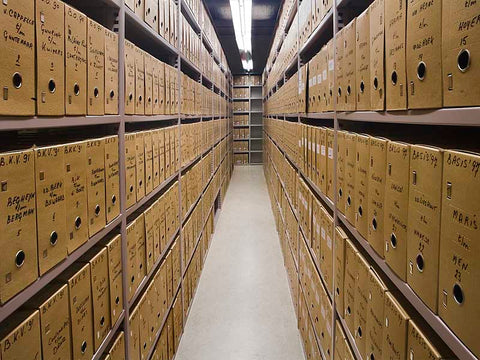T-Tag Treasury Tags in Archives November 06 2015, 0 Comments

We've been talking to a number of archives about the suitability of T-Tag treasury tags for document storage and preservation purposes. It is clear that T-Tag treasury tags have a lot of potential for use within archives, due in large part to the fact that they are 100% polypropylene.
The use of any tag or clip within archives is always a compromise. Practices and guidelines differ from archive to archive, and between different jurisdictions, and are influenced by the types of records being kept, the purpose for which they are being preserved, the materials available, the teaching practices in place and the personal preferences of archivists and conservators.
Polypropylene as an archive material

Polypropylene is an inert stable material. It will not rot, support mould growth or absorb moisture. An article which appeared in the May 1998 issue of International Preservation News reported on tests carried out on polypropylene by the Image Permanence Institute in Rochester, New York and ETRS Pty Ltd. These tests, which compared the properties of paperboard and polypropylene for document preservation purposes, found that:
- during acetone digestion, no significant degradation was observed of the polypropylene
- during the boiling water leach process, the polypropylene samples maintained their integrity
- the polypropylene gave no detectable acid response when titrated
- no detectable metals were released from the polypropylene, which gave the same results as a control blank
The article observed that:
Seventeen years since that article appeared, the use of polypropylene in archives is far more accepted, and polypropylene is in many cases a cheaper option than previously accepted alternatives."Many archivists have been trained in paper practices, not in plastics. Plastics is a relatively new science which involves quite different questions. To some archivists choosing a plastic has meant taking risks. In many cases this has however resulted in decisions being made in favour of the known bad characteristics of paperboard because it is cheap rather than use the unproven virtues of the more costly polypropylene."
'Plastic-ended' Treasury Tags
'Plastic-ended' treasury tags comprise a piece of string with polypropylene T-bars on each end. The use of 'plastic-ended' treasury tags in archives is now fairly widespread in the UK and is recommended by the International Council on Archives and International Records Management Trust (Managing Current Records: A Procedures Manual), The National Archives (Preparation of Records: How to Prepare) and Northumberland County Council (Preparation of Records manual), to name but a few.
It is clear from our conversations with archives that a great many archives in the UK are using 'plastic-ended' treasury tags to manage punched documents. Some archives are using thousands of them, whilst others have cause to use them only from time-to-time (due to the different types of collections held by different archives). Some are using alternative materials for punched documents, such as brass paper clips.
T-Tag Treasury Tags
Those archives considering using T-Tag treasury tags are attracted primarily by the fact that the entire T-Tag treasury tag (including the cord) is made from polypropylene, so the entire tag comprises an inert and stable material. In addition, it has been noted that (unlike some ‘plastic-ended’ treasury tags) the T-bars of T-Tag treasury tags have rounded smooth edges, with no potentially damaging injection gate mark protrusions on the T-bar. T-Tag treasury tags are also a very economical solution, compared to alternatives.
Previous article: Bulk Order T-Tag Treasury Tags Online
Haven't used a T-Tag treasury tag before? Why not try them out out! Buy T-Tag treasury tags today starting from only £0.99.
